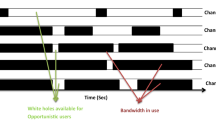Abstract
In the framework of cognitive radio, joint spectrum sensing and access strategies have been extensively studied recently. As a matter of fact, the sensing ability of cognitive radio is limited and the channel statistics may not be known as a priori. In this paper, we investigate the blind spectrum selection with the multi-armed bandit model, considering both primary user activities and channel quality to meet diverse QoS requirements, e.g. high transmission success rate for real-time applications and high throughput for best-effort applications. Firstly we propose a policy kth-UCB1 which is based on the UCB1 policy for multi-armed bandit problem but converges to the kth-best arm. Then we design a distributed order-optimal policy for multiple users accessing the rank-best channels according to their QoS requirements. The expected regret of proposed policy is proved to be logarithmic in the number of time slots and the simulation results implies it has better performance.










Similar content being viewed by others
References
Zhao, Q., & Sadler, B. M. (2007). A survey of dynamic spectrum access. IEEE Signal Processing Magazine, 24(3), 79–89.
Huang, J., Xing, G., Zhou, G., & Zhou R. (2010). Beyond co-existence: Exploiting WiFi white space for Zigbee performance assurance. In 2010 18th IEEE international conference on Network Protocols (ICNP) (pp. 305–314).
Anandkumar, A., Michael, N., & Tang A. (2010). Opportunistic spectrum access with multiple users: Learning under competition. In INFOCOM, 2010 Proceedings IEEE. (pp. 1–9).
Liu, K., & Zhao, Q. (2010). Decentralized multi-armed bandit with multiple distributed players. In Information theory and applications workshop (ITA), 2010. (pp. 1–10).
Lee, W.-Y., & Akyldiz, I. F. (2011). A spectrum decision framework for cognitive radio networks. IEEE Transactions on Mobile Computing, 10(2), 161–174.
Lai, T. L., & Robbins, H. (1985). Asymptotically efficient adaptive allocation rules. Advances in Applied Mathematics, 6(1), 4–22.
Agrawal, R. (1995). Sample mean based index policies with O(log n) regret for the multi-armed bandit problem. Advances in Applied Probability, 27(4), 1054–1078.
Auer, P., Cesa-Bianchi, N., & Fischer, P. (2002). Finite-time analysis of the multiarmed bandit problem. Machine Learning, 47(2–3), 235–256.
Zhao, Q., Tong, L., Swami, A., & Chen, Y. (2007). Decentralized cognitive MAC for opportunistic spectrum access in ad hoc networks: A POMDP framework. IEEE Journal on Selected Areas in Communications, 25(3), 589–600.
Lai, L., El Gamal, H., El-Gamal, H., Jiang, H., & Poor, H. V. (2011). Cognitive medium access: Exploration, exploitation, and competition. IEEE Transactions on Mobile Computing, 10(2), 239–253.
Liu, K., & Zhao, Q. (2008). A restless bandit formulation of opportunistic access: Indexablity and index policy. In 5th IEEE annual communications society conference on sensor, mesh and ad hoc communications and networks workshops, 2008, SECON Workshops’08 (pp. 1–5).
Anandkumar, A., Michael, N., Member, S., Tang, A. K., & Swami, A. (2011). Distributed algorithms for learning and cognitive medium access with logarithmic regret. IEEE Journal on Selected Areas in Communications, 29(4), 731–745.
Torabi, N., Rostamzadeh, K., & Leung, V. C. M. (2012). Rank-optimal channel selection strategy in cognitive networks. In 2012 IEEE on Global Communications Conference (GLOBECOM) (pp. 410–415).
Kalathil, D., Nayyar, N., & Jain, R. (2014). Decentralized learning for multiplayer multiarmed bandits. IEEE Transactions on Information Theory, 60(4), 2331–2345.
Qu, S., & Xin, Y. (2009) Distribution of SNR and error probability of a two-hop relay link in Rayleigh Fading. In 2009 IEEE 70th vehicular technology conference fall (VTC 2009-Fall) (pp. 1–4).
Anantharam, V., Varaiya, P., & Walrand, J. (1987). Asymptotically efficient allocation rules for the multiarmed bandit problem with multiple plays-Part I: I.I.D. rewards. IEEE Transactions on Automatic Control, 32(11), 968–976.
Kim, H., & Shin, K. G. (2008). Efficient discovery of spectrum opportunities with MAC-layer sensing in cognitive radio networks. IEEE Transactions on Mobile Computing, 7(5), 533–545.
Huang, J., Zhou, H., Chen, Y., Chen, B., Zhu, X., & Kong, R. (2012). Optimal channel sensing order for various applications in cognitive radio networks. Wireless Personal Communications, 71(3), 1721–1740.
Song, M., & He, B. (2007) Capacity analysis for flat and clustered wireless sensor networks. In International conference on wireless algorithms, systems and applications, 2007. WASA 2007 (pp. 249–253).
Gai, Y., & Krishnamachari, B. (2011) Decentralized online learning algorithms for opportunistic spectrum access. In 2011 IEEE global telecommunications conference (GLOBECOM 2011) (pp. 1–6).
Acknowledgments
The work presented in this paper was supported by the International S&T cooperation Program of China under Grant No. 2013DFA12460 and the Fundamental Research Funds for the Central Universities of China under Grant No. 2042015KF0053. The authors also thank Aurélien Garivier and Emilie Kaufmann for providing their MAB simulation code.
Author information
Authors and Affiliations
Corresponding authors
Rights and permissions
About this article
Cite this article
Chen, Y., Zhou, H., Kong, R. et al. QoS-Based Blind Spectrum Selection with Multi-armed Bandit Problem in Cognitive Radio Networks. Wireless Pers Commun 89, 663–685 (2016). https://doi.org/10.1007/s11277-016-3301-1
Published:
Issue Date:
DOI: https://doi.org/10.1007/s11277-016-3301-1




